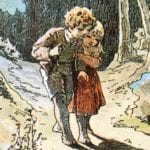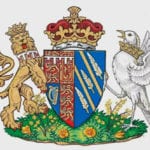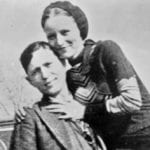 Crime
Crime  Crime
Crime  Technology
Technology 10 Hilariously Over-Engineered Solutions to Simple Problems
 Miscellaneous
Miscellaneous 10 Ironic News Stories Straight out of an Alanis Morissette Song
 Politics
Politics 10 Lesser-Known Far-Right Groups of the 21st Century
 History
History Ten Revealing Facts about Daily Domestic Life in the Old West
 Weird Stuff
Weird Stuff 10 Everyday Products Surprisingly Made by Inmates
 Movies and TV
Movies and TV 10 Actors Dragged out of Retirement for One Key Role
 Creepy
Creepy 10 Lesser-Known Shapeshifter Legends from Around the World
 Animals
Animals 10 Amazing Animal Tales from the Ancient World
 Gaming
Gaming 10 Game Characters Everyone Hated Playing
 Crime
Crime 10 Terrifying Serial Killers from Centuries Ago
 Technology
Technology 10 Hilariously Over-Engineered Solutions to Simple Problems
 Miscellaneous
Miscellaneous 10 Ironic News Stories Straight out of an Alanis Morissette Song
Who's Behind Listverse?

Jamie Frater
Head Editor
Jamie founded Listverse due to an insatiable desire to share fascinating, obscure, and bizarre facts. He has been a guest speaker on numerous national radio and television stations and is a five time published author.
More About Us Politics
Politics 10 Lesser-Known Far-Right Groups of the 21st Century
 History
History Ten Revealing Facts about Daily Domestic Life in the Old West
 Weird Stuff
Weird Stuff 10 Everyday Products Surprisingly Made by Inmates
 Movies and TV
Movies and TV 10 Actors Dragged out of Retirement for One Key Role
 Creepy
Creepy 10 Lesser-Known Shapeshifter Legends from Around the World
 Animals
Animals 10 Amazing Animal Tales from the Ancient World
 Gaming
Gaming 10 Game Characters Everyone Hated Playing
10 Unusual Little-Known Fairy Tales
Here are ten lesser-known but fascinating stories which I hope will illustrate the many different aspects of the twisted little land of Fairy Tales—a world full of impossible situations, mythical creatures, bizarre happenings, violence, vengeance and greed. Originally fairy tales were designed to entertain and to teach morals and reflected the spiritual and cultural beliefs of the time but some of these stories—like The Red Shoes—are all too clearly designed to put the fear of god into little children and many of them emphasize the fact that it is okay to react with violence when violence is done unto you. Though many of these ideas are outdated in today’s society, there is no doubt that these are still wonderfully entertaining little yarns.
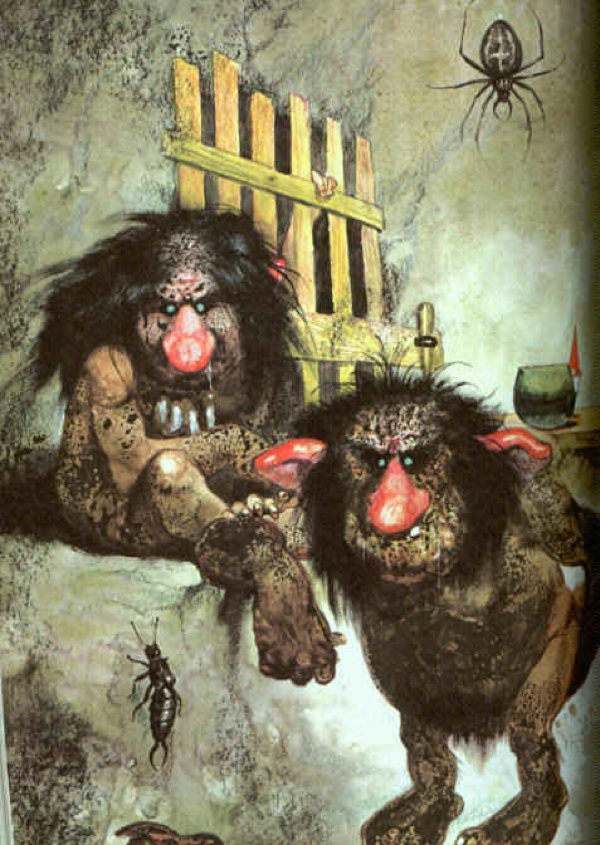
A stunningly beautiful young princess, whose name is Nella, is having a secret affair with a handsome prince who lives many miles away. The two lovers build a glass tunnel that runs under the ground—from the prince’s castle into the princess’s bedroom. Every night the prince runs through the tunnel butt-naked at top-speed to ‘spend time’ with his young princess.
Nella’s two sisters, who are ugly and evil, learn of the affair and smash the glass tunnel. That night, the prince is running so fast to reach his young lover that he doesn’t see the broken glass, and because he is butt naked, the skin all over his body is sliced to ribbons. Because the glass that cut him was enchanted his wounds will not heal. The prince’s father vows that the woman who can find a remedy for the enchanted wounds will be the prince’s wife.
Nella is heartbroken upon hearing of her mortally wounded prince, and goes out into the wild to find a remedy that will heal him. Luckily, she overhears two ogres telling each other that the only thing in the whole world that will heal the prince is to smear the fat from their own bodies all over the prince. Nella, pretending to be lost in the woods, begs the ogres to let her into their house. The ogre husband, fancying a bit of human flesh, lets her in eagerly but sadly he drinks so much alcohol that he passes out before he gets to eat her.
Nella quickly gets to work and slaughters him then collects all the fat from his body in a bucket. She then rubs dirt all over her face to disguise herself and makes her way to the princes palace. She smears the fat into the prince’s wounds and he is healed as if by magic, then she reveals her identity and the marriage is swiftly arranged. And her sisters? They are burned alive of course.
You can read the first volume of Il Pentamerone here.
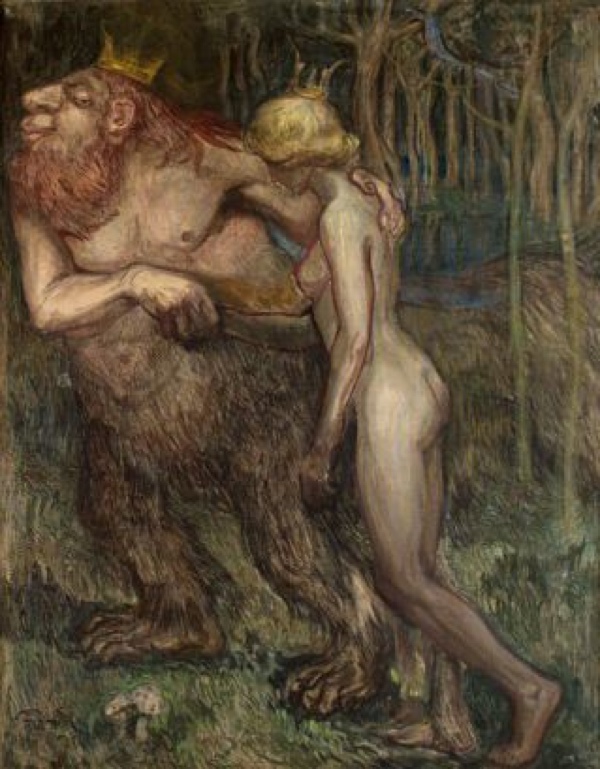
A King feeds a flea on his own blood until it is the size of a sheep, then he slaughters it, skins it and promises his daughter to the man who can guess what animal the skin came from. Suitors come from far and wide, but none can guess the origins of the pelt. Then a hideously ugly old ogre decides to try his luck—he sniffs the pelt and identifies it immediately as that of a flea.
The king, true to his word, hands over his daughter. She begs and pleads with him, but he sends her away calling her names like ‘‘breath of my arse’’ and threatening that he will “leave her not a whole bone in her body” if she refuses to marry the ogre.
The princess is horrified to find that her new home is made from human skeletons, and more horrified still when her new hubby prepares her a feast made from human carcasses. She begins to vomit repeatedly and the ogre promises to catch her some pigs to eat until she can stomach human flesh. While the ogre is hunting, an old woman hears the maiden wailing and sends her seven sons (who are all endowed with magical powers) to rescue the princess. They eventually defeat the ogre, by shooting out his eyeball and beheading him, and the princess returns home to her father who is (surprisingly) overjoyed to see her returned home safe to him.
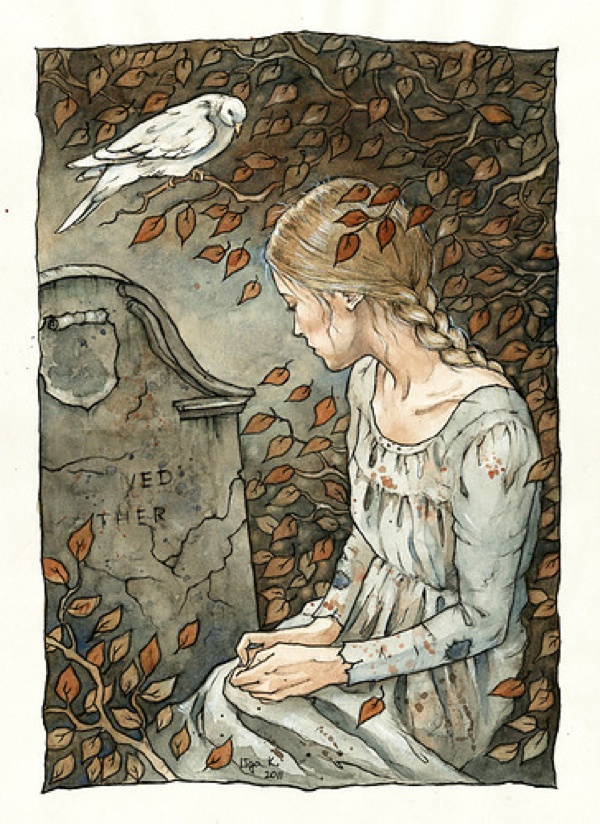
While searching for her stray black sheep in the woods, a woman comes across the path of a witch who turns the woman into a sheep. The witch then disguises herself as the woman and returns to the house where woman’s husband and daughter live. The witch convinces the husband to slaughter the sheep to prevent it from wandering again. Their daughter weeps, but her mother (still a sheep) tells her not to eat of her flesh once she is slaughtered and to bury her bones at the edge of the field. The father slaughters the sheep and the witch makes soup from the meat and bones. The daughter buries what’s left of her mother in the field and a birch tree grows from the bones.
The witch hates her new step-daughter, but eventually her and the husband have a daughter of their own. One day a king declares that a festival is to be held for three days. The step mother sets the girl an impossible task, threatening to devour her if she is unable to complete it before they return from the nights festivities. The girl weeps over the birch tree, and the spirit of her dead mother completes her task for her and sends her off to the feast in beautiful garments—the prince falls instantly in love with the maiden.
As they dine the witches daughter gnaws bones under the table and the prince, thinking she is a dog, boots her so hard he breaks her arm. The beautiful sister flees before her family can return home to find her missing, but her ring is stuck on the palace door handle which the prince has spread with tar. The next two nights go the same way, with the prince breaking the witches daughters leg on the second night and dislodging her eyeball the third night.
The beautiful girl loses her bracelet, then her golden shoe in the tar the prince spreads to trap her. The prince wishes to marry the woman who will fit the lost items, and the witch forces her ugly daughter into them. However, when the prince discovers who the real bride is, they throw the ugly sister across a river to act as a bridge so they can escape the clutches of the witch.
Read The Wonderful Birch story here.
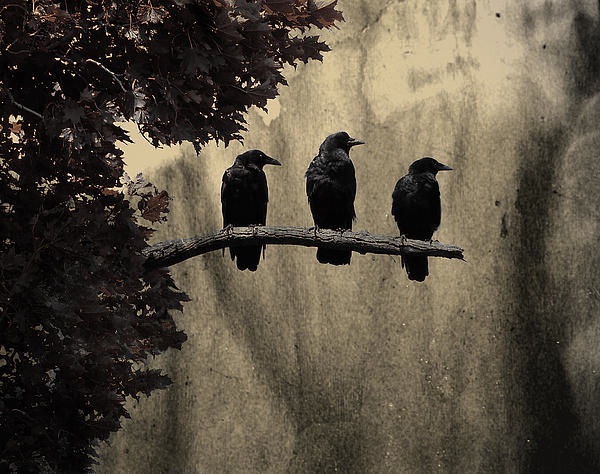
A young king falls madly in love with the princess of the golden palace after laying eyes on a portrait depicting her likeness, and devises a plot to kidnap her. The young king and his faithful servant Johannes travel to the golden kingdom, trick the princess into coming onto their boat and then set sail when she is below deck. Initially she is terrified, but when her kidnapper reveals he is a king all is forgiven and she agrees to marry him.
As they are sailing, faithful Johannes overhears three ravens conversing with each other. They predict three misfortunes that will befall the king: A fox-red horse, a poisoned shirt, and the death of his wife. The only way to save the king is if someone shoots the horse in the head, burns the poisoned shirt, and takes three drops of blood from the right breast of the new queen.
However, the saviour must not utter a word of his tasks or he shall turn to stone. When they arrive ashore, the king leaps onto the back of a fox-red horse which faithful Johannes promptly shoots in the head. When they arrive at the palace, the king finds a shirt that looks to be made of gold, but faithful Johannes throws the shirt in the fire. At the wedding dance, the queen falls down as if dead on the palace floor but faithful Johannes quickly takes three drops of blood from her right breast, saving her life.
The king, angered at the sight of his servant fondling the new queen’s breast, sentence’s faithful Johannes to hang. Johannes reveals the plot, but turns to stone. The king and queen eventually have two children and one day the statue of Johannes tells the king that if he will slaughter his own children, his trusty servant will be brought back to life. The king eagerly takes his sword and lops off his own children’s heads. He smears his children’s blood onto the stone and faithful Johannes comes back to life.
As a reward for the kings willingness to execute his own children, faithful Johannes places the children’s heads back onto their corpses and brings them back to life; they continue to run around as if nothing had happened.
You can read the full story of Faithful Johannes here.
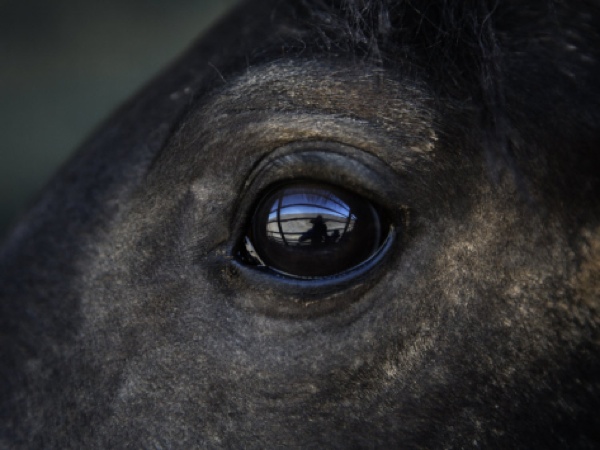
A starving dog runs away from its cruel master and meets a sparrow—the two become great friends. The sparrow steals meat and bread for the dog and when the dog has eaten his fill he goes to sleep on the road. A wagon drives by, and the sparrow flutters about the drivers head telling him to watch out for the dog, but the driver pays no heed and runs the dog over, killing it. The sparrow swears vengeance, saying ‘’thou hast killed my brother dog, it shall cost thee thy cart and horses!’’
The sparrow then pecks out the eyes of one of the horses. The driver swings his axe at the sparrow, but chops open his horse’s head instead. The sparrow pecks out the eyes of the other two horses and the unfortunate beasts also get their heads chopped open as their master swings his axe at the sparrow. The sparrow then sings ‘’It shall cost thee thy home’’ and flies to the driver’s house.
The sparrow flutters from room to room as the driver, blind with rage, smashes up his entire house in his attempts to kill the bird. Now the driver sits amongst the rubble and says ‘’’what an unfortunate man I am!’’ ‘’Not unfortunate enough’’ says the sparrow, ‘’It shall cost thee thy life!’’. The driver catches the sparrow in his hand, and wanting it to suffer a fate worse than death, he swallows it whole—but the bird begins to flutter about his body and pokes its head out of the drivers mouth. The driver tells his wife to kill the sparrow with the axe as the bird sits in his mouth, but as the wife swings the sparrow flutters away and the wife chops open the drivers head instead, killing him.
Here is the above version of The Dog and the Sparrow.
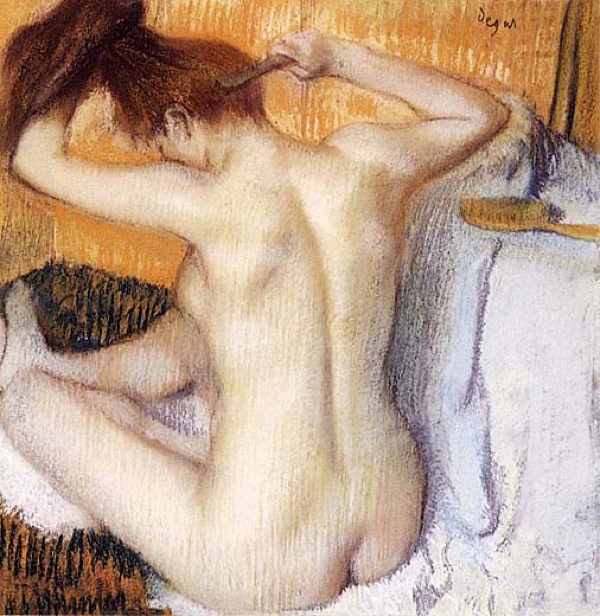
After his wife dies, a King decides that the only woman in the world who matches his dead wife’s beauty is his own daughter Preziosa – therefore, Preziosa must now marry her deranged father. He tells her that if she will not marry him that very evening then ‘’when I am finished with you there will be nothing left but your ears’’.
An old woman then gives the terrified girl an enchanted bit of wood that will turn her into a bear when she puts it in her mouth. Preziosa – now a bear—flees into the forest and resolves never again to reveal her true form lest her father learns of her whereabouts. A prince discovers the wonderfully friendly she-bear in the woods and takes her home to be his pet.
One day when she believes she is alone, Preziosa takes the bit of wood out of her mouth to brush her hair. The prince looks out his window, spies a gorgeous maiden in his garden and rushes out to find her, but she hears him coming and quickly puts the wood back into her mouth. The prince searches throughout the garden but he cannot find the maiden anywhere—in her place is only his pet she-bear.
The prince becomes sick with lust for the bear-girl and begins to waste away. On request from her son, the prince’s mother sends for the she-bear who is now to reside in the princes bedroom, cook his meals and make his bed for him. The prince becomes overcome with lust for the bear, and begs his mother to let him kiss the animal.
While the mother watches and encourages them enthusiastically, man and bear lock lips. They are kissing so passionately that the bit of wood slips from Preziosa’s mouth and the prince finds that he now holds a stunningly beautiful maiden in his arms. Rejoicing, they get married, and presumably everybody lives happily ever after.
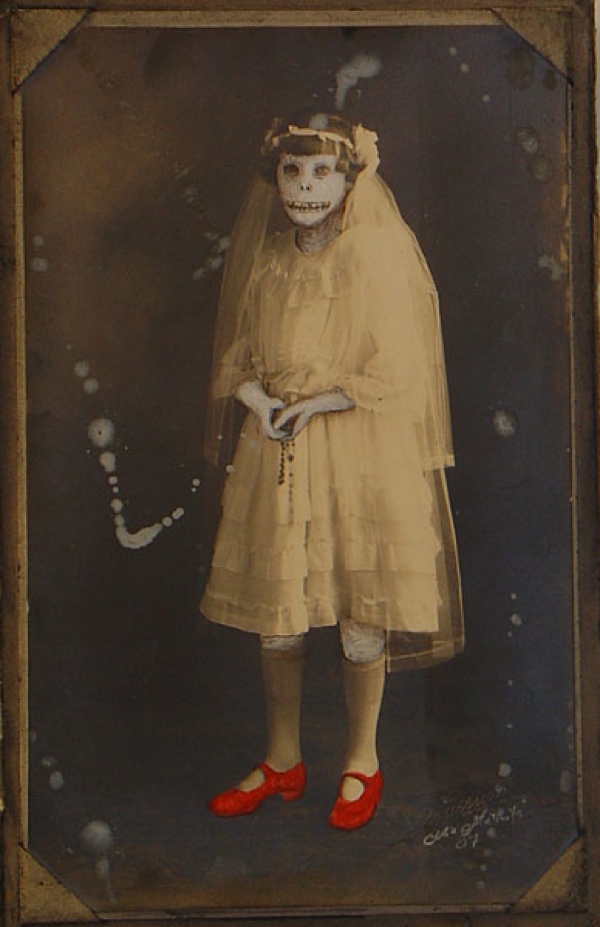
Karen is a very poor girl who goes barefoot until an old lady adopts her and buys her a beautiful pair of red shoes. When Karen is old enough to be confirmed, she chooses to wear her beautiful red shoes to church. During the church service, Karen can think only of her red shoes. After the service the old lady scolds Karen, telling her now that she is a grown-up christian she must never wear red shoes to church again.
The next Sunday, Karen chooses to wear her red shoes to communion and again can focus only on how pretty she looks for the entire service. As they are leaving the church, her shoes start to dance on their own and when Karen climbs into the carriage, she kicks the old woman violently before the coachman removes the shoes from Karen’s feet. The old lady falls ill and it is Karen’s job to care for her, but Karen is invited to a ball and decides to wear her red shoes to the dance rather than care for the sick old woman.
When Karen begins to dance, the shoes take on a life of their own. They dance Karen away into the dark woods. Terrified, she tries to tear the shoes off but they have become one with her feet—she continues to dance through field and meadow, rain and shine for many days. While dancing through a graveyard she sees an angel who tells her she shall dance until she is cold and dead, and will continue to dance even when she is nothing but bones.
Karen dances unceasingly over hill and heath, and over thorns and branches until her skin is torn and bleeding. She eventually comes to the house of an executioner and begs him to chop off her feet, so that she can finally rest. The executioner does as Karen wishes and the shoes dance away with her little feet still in them. She kisses the hand that wielded the axe and he fashions her little wooden feet and a pair of crutches.
Karen now wishes to go to church to repent, but the red shoes, with her feet still in them, dance in front of the church doors so that Karen cannot enter. Karen weeps bitter tears in her narrow bare room and eventually the angel returns to her: He transforms her room into a church and as the organ plays, Karen becomes so full of peace and joy that her heart breaks and she dies.
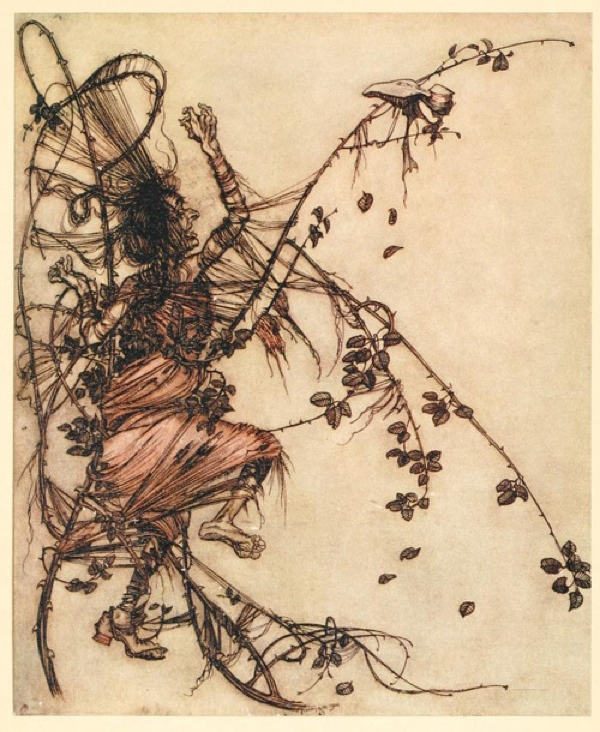
A witch’s ugly daughter grows jealous of her step-sisters beautiful apron, so mother and daughter plot to kill the step-daughter. When the girls go to bed, the witch’s daughter is to lie near the wall, and the mother will chop off the step-child’s head as she sleeps. The step-daughter overhears this conversation, so when the step-sister falls asleep the beautiful sister pushes the ugly one to the edge of the bed, and lies by the wall.
In creeps the witch and chops off her own child’s head, then she goes to bed. The step-daughter then takes her sister’s dismembered head and drips the blood around the house; one drop of blood by the stove, one on the stairs and one by the bed – she then steals the witches wand and flees with her lover Roland.
In the morning the witch calls for her daughter and the first blood drop sings from the kitchen ‘’I am here warming myself’’, the second blood drop calls ‘’I am on the stairs’’ and the third calls out ‘’I am here by the bed’’. Then the witch finds her own daughters beheaded body lying in a pool of blood. In a rage, the witch puts on her many-league boots which can fathom a mile in an hour but when she catches up to the lovers, the girl turns her lover into a lake and herself into a duck.
The witch cannot entice the duck from the water, so returns home. The next day the girl turns herself into a flower in the middle of a bramble hedge and her lover turns into a fiddler. The witch comes by hunting for the lovers and spies the beautiful flower whom she recognizes as her step-daughter. As the witch reaches into the hedge to pick the flower, Roland begins playing the fiddle. The music is enchanted and the witch begins to dance around the bramble bush as the thorns tear at her clothes until she is naked. She continues to dance wildly round and round as her skin is shredded to ribbons and eventually she falls down dead.
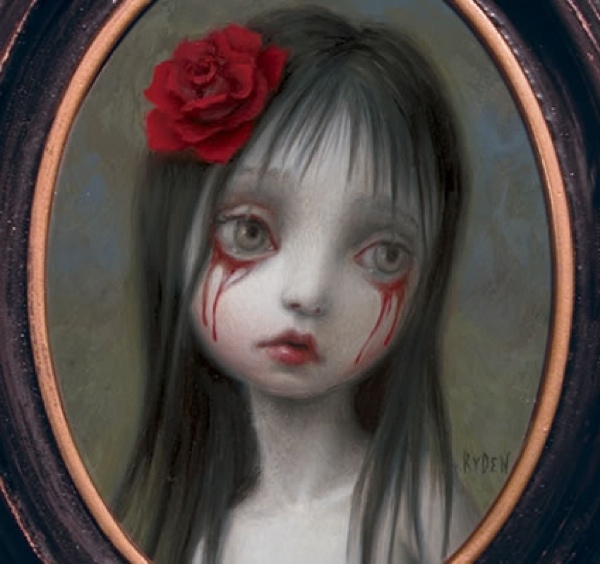
This twisted little tale begins with a prince and princess who are brother and sister. The brother has to go away to war, and entrusts his beloved rose garden to his sister who must tend to it day and night. The princess pines away amongst her brothers roses, then quite mysteriously, she gives birth to a baby girl. The princess is deeply ashamed of the baby girl, who was born with a rose on her forehead. As the little girl grows the princess swears to her daughter every day that she will kill her if the girl should reveal her identity.
After 5 years the prince returns, and the princess swears to her daughter repeatedly that if she should reveal who she is to the prince her mother will kill her. The prince visits the little girl’s school but she refuses to eat the cherries he offers her. The other girls in her class eagerly eat the cherries, but become so excited that they begin to throw the fruit around and a cherry becomes lodged in the daughter’s hair. The next day the mother finds the cherry stuck in her daughters locks.
The mother, assuming the girl has removed her hood and revealed herself in the prince’s presence, stabs her comb violently into her little girls head, killing her. She then puts the girl into an iron chest and locks the chest in a room in the palace. The mother grows ill with guilt and eventually dies, entrusting the key to her brother and beseeching him never to open the door that the key belongs to. Once his sister is dead, the prince becomes lonely and takes a wife.
One day the prince goes away on a hunt and leaves the key with his wife, telling her not to open the locked door. His wife’s mother convinces her to open the door and they find the iron chest which they open to discover a beautiful young woman sitting inside happily sewing. Thinking the prince is keeping her in the chest for his own enjoyment, the mother and daughter pull the fair maiden out and burn the skin all over her face and body with a heated iron. When the prince comes home they tell him she is their new slave.
The prince eventually overhears the young slave telling her sorrowful story to a talisman, and realizing she is his niece (and possibly his daughter) he releases her and asks her how his wife should be punished. Mother and daughter are both burned all over with hot irons, then buried alive inside a wall to die slowly and miserably. The prince and his niece/daughter remain alone together in the castle and the prince never remarries because presumably she is all the company he needs. Now that’s one messed up family.
Go here to read The Maiden with the Rose on her Forehead in its entirety.
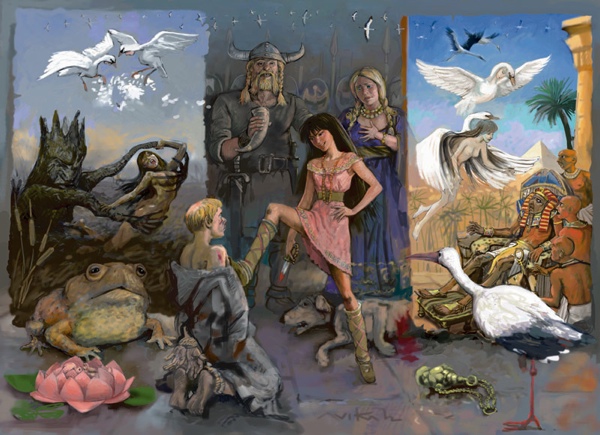
An Egyptian princess dons the garb of a wild swan, and flies to a distant marsh to gather a flower that will heal the king of Egypt. The princess removes her plumage and climbs naked into the marsh to gather the healing flowers, but the Marsh King pulls her down into the murky black depths beneath the water and rapes her. Many months pass and eventually a water lily opens on the surface of the water, inside the flower is a baby girl. A stork carries the baby to the wife of a Viking lord who names the little-girl Helga.
As Helga grows she becomes ever more beautiful, but she is evil and black of heart. She likes to splash about in the blood of animals and bite the heads off roosters. However, by night she turns into a hideous dwarf-sized frog that has a kind soul but can only croak mournfully.
When Helga is 16, the Viking lord captures a Christian priest. Helga begs that savage dogs be let loose upon the priest, but the Viking lord insists the priest is to be sacrificed upon the death-stone according to tradition. Helga gleefully stabs her knife into a dog, just to make sure the blade is sharp enough.
When night comes, the gentle frog Helga rescues the priest and they ride away together on Helga’s horse. In the morning however, the beautiful Helga tries to stab the priest but he enchants her with a symbol of the cross he makes out of two sticks and she becomes dumb and silent until they are confronted by a band of robbers. In the hopes of getting their hands on Helga, the robbers slice the horse’s neck with an axe and blood spurts out, then they smash the Christians head open with an iron hammer and his blood and brains are spattered around. The group of men then seize Helga but luckily for her the sun is setting and she turns back into a monstrously ugly frog. The terrified men flee.
Helga eventually makes the sign of the cross and her frog skin falls away as if by magic, never to return. She falls asleep and when she wakes she finds the ghosts of the dead priest and his dead horse standing before her. They ride away together to the marsh where Helga was conceived and the priest lifts Helga’s birth mother from the water. Then the phantoms of priest and horse vanish and Helga and her birth mother are left alone beside the marsh.
They return to Egypt where Helga is eventually married to an Arabian prince, but on the night of the wedding the spirit of the priest comes to Helga to show her what heaven looks like. After three minutes have passed in heaven she returns to Earth but finds that hundreds of years have gone by. Helga’s body turns to dust and all that is left of her is a faded water lily.
